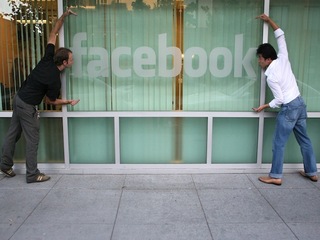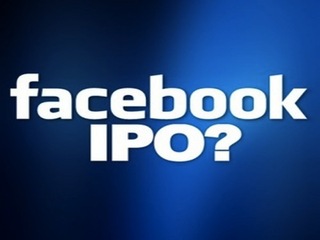Trump rescinds Biden executive order on artificial intelligence
The EO set AI safety and security standards and called for a report on AI's impact on labor
Read more...
Everyone is waiting for Facebook to file its S-1 for its initial public offer. Investors, techies and competitors are excited to pick apart all the financial inner workings and hidden gems that lay inside the highly anticipated document.
Since its inception in 2004, the social networking site that capitalizes on consistent sharing of personal information has been tight-lipped about its revenue and now is the time that the curtain opens, at least a little.
Rumors have been swirling that the paperwork for an IPO from Facebook could come as soon as Tuesday night or as late as Friday morning but everyone is expecting the social networking site to price shares to raise $10 billion in what could easily be the biggest non-telecom IPO in history.
While many are placing the valuation of Facebook in the wide-berth range of $75 billion- $100 billion, many analysts are hedging their bets near the $90 billion-mark.
I spoke with Sam Hamadeh about the eminent IPO and what investors can expect. Hamadeh is CEO of a private financial data authority company called PrivCo.
PrivCo has been following the investments and revenue actions around Facebook for quite some time and has used its national financial analysts, editorial quality review and other market research to provide current and future investors a better understanding of what this and other private company are working with.
Hamadeh told me that the initial offer price for the stock will fall in the $38-$40 range and the company will have Morgan Stanley leading the filing with participation from Goldman Sachs. He reported the PrivCo findings to the Washington Post late last week, and unlike other analyst firms that have increased the ranges they are expecting, Hamadeh is holding steady with the initial predictions he and his financial consultants made.
When I asked Hamadeh what facts and figures people are most interested in finally getting their hands on, he pointed to three main areas: actual revenue, where the revenue is coming from, and who is holding stock/ stock options.
Revenue
Facebook has been very vague about the actual revenue it gets out of its service, but we do know that the company is profitable. Many analysts and investors have made estimates that in 2011, Facebook made $5 billion or more (some even reaching as high as $7 billion.)
Hamadeh told me that those estimates are likely far too ambitious since Facebook has focused for a long time on capturing its audience and building a specific user experience. His estimate are close to the $4 billion mark.
"I think it will come out as a bit of a damper when they see the real number and at first that will disappoint people," Hamadeh said. "But [Facebook] will get a one-time pass since there were no official numbers before this and there have been a lot of monetizing additions lately and many still to come."
Where is the revenue from?
While many people see the advertisements every time they log onto their Facebook profiles and are able to see big global brands marketing all over the site, many have pointed that advertising may not really be where all their money is coming from. Not to say that a lot of money doesn't come from ads, especially after recent reports show Facebook pushing Yahoo out of the top ad-share display spot.
This past Monday, comScore reported that Facebook captured 27.9% of the U.S. display advertising market in 2011 -- which surpassed Yahoo in its share of display ads in 2009. Facebook now has more than double Yahoo’s market share in 2010 and 2011. Both Microsoft and Google finished 2011 with less than 5%.
When you see that Facebook is taking such large ad-shares on the Internet marketing space it is hard to believe that other areas of the business could be bringing in more revenue -- but that might just be the case. PrivCo is betting a big part of the revenue comes from virtual goods.
Most premium applications on Facebook have a "freemium" model where the application itself and some functionality is free but many people buy virtual goods to get better service or other functions. From Spotify to Zynga to Facebook movie rentals, each sell virtual coins in exchange for a service and each virtual coin bought with real money means a slice goes back to Facebook. The social network takes a 30% bite out of every virtual dollar spent and between movie applications, social gaming and music -- this could turn out to be a lot of coin. Perhaps more than 50% of the business.
Who has a stake in Facebook
While we all know that CEO Mark Zuckerberg, Peter Thiel, Reid Hoffman, Mark Pincus, Meritech Capital Partners and Microsoft will come out smiling with almost IPO showing, many would like to see all the other private investors that got in at various stages of Facebook development. There is also the interest to see what the executives and board of directors have been banking in stock options for their service and overall, it will be interesting to see just how many billionaires come out of this company going public in this relatively small 3,000 employee company with a nearly one billion users.
We should also all expect that Facebook will stay in character through the filing and not just hand over all the information and analysis it has. While some companies prefer to just through all the numbers in and explanations in the filing in order to get the IPO done as cleanly as possible, others choose to put in the bare minimum in the filing, hoping to get by (or possibly amend the filing later with more information.) Facebook, unlike Groupon and Zynga, likely not need to throw in all the analysis and future expectations in order to build a marketing buzz over its product and will disclose just enough to get investors ready for opening day on the markets.
The EO set AI safety and security standards and called for a report on AI's impact on labor
Read more...The agency also published draft guidance on the use of AI in drug development
Read more...The biggest focus areas for AI investing are healthcare and biotech
Read more...Startup/Business
Joined Vator on
Zynga is the largest social gaming company with 8.5 million daily users and 45 million monthly users. Zynga’s games are available on Facebook, MySpace, Bebo, Hi5, Friendster, Yahoo! and the iPhone, and include Texas Hold’Em Poker, Mafia Wars, YoVille, Vampires, Street Racing, Scramble and Word Twist. The company is funded by Kleiner Perkins Caufield & Byers, IVP, Union Square Ventures, Foundry Group, Avalon Ventures, Pilot Group, Reid Hoffman and Peter Thiel. Zynga is headquartered at the Chip Factory in San Francisco. For more information, please visit www.zynga.com.

Joined Vator on
Managing Partner, Founders Fund
Joined Vator on

Joined Vator on







